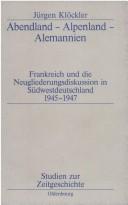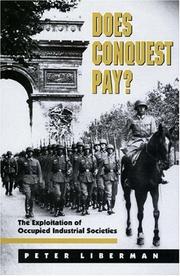| Listing 1 - 2 of 2 |
Sort by
|

ISBN: 3486563459 3486595938 Year: 1998 Publisher: De Gruyter
Abstract | Keywords | Export | Availability | Bookmark
 Loading...
Loading...Choose an application
- Reference Manager
- EndNote
- RefWorks (Direct export to RefWorks)
Wohl kaum eine Ereignis der deutschen Geschichte hatte so vielfältige und weitreichende Folgen wie das Ende des Zweiten Weltkrieges. Der Schock produzierte eine wahre Flut an Überlegungen, Planspielen und Denkschriften, die sich immer wieder mit der Frage der politischen, gesellschaftlichen und moralischen Erneuerung beschäftigten. Weitgehend unbekannt sind in diesem Zusammenhang die heftigen Diskussionen geblieben, die seit Sommer 1945 im deutschen Südwesten entbrannten. Katholische Intellektuelle und Honoratioren sahen nun den Zeitpunkt gekommen, die nationale Bindung aufzugeben; an die Stelle eines preußisch-kleindeutschen Reichs sollte eine stammesföderalistisch geprägte Neugliederung treten. Überlegungen dieser Art lassen sich bereits vor 1933 zwischen Lörrach, Konstanz und Karlsruhe, aber auch bis Augsburg und Bregenz nachweisen. Zusätzliche schien die Aufteilung der Länder Baden und Württemberg durch die französische und amerikanische Besatzungszone, die Chance für eine völlig neue Grenzziehung zu erhöhen. Auf der Basis unbekannter französischer, deutschen, schweizerischer und österreichischer Quellen sowie bislang unzugänglicher Privatnachlässe schildert der Autor minutiös den Verlauf der Diskussion und die Visionen der wichtigsten Wortführer.
Military government --- French --- Reconstruction (1939-1951) --- Military occupation. --- History --- Belligerent occupation --- De facto doctrine (International law) --- Occupation, Military --- Occupied territory --- World War, 1939-1945 --- Frenchmen (French people) --- Military rule --- Reconstruction --- Armed Forces in foreign countries --- War (International law) --- Conquest, Right of --- Postwar reconstruction --- Ethnology --- Public administration --- Civil-military relations --- Military occupation

ISBN: 0691029865 0691002428 9786613339706 1400821746 1283339706 1400812542 9781400821747 9781283339704 1400804930 Year: 1998 Publisher: Princeton, NJ
Abstract | Keywords | Export | Availability | Bookmark
 Loading...
Loading...Choose an application
- Reference Manager
- EndNote
- RefWorks (Direct export to RefWorks)
Can foreign invaders successfully exploit industrial economies? Since control over economic resources is a key source of power, the answer affects the likelihood of aggression and how strenuously states should counter it. The resurgence of nationalism has led many policymakers and scholars to doubt that conquest still pays. But, until now, the "cumulativity" of industrial resources has never been subjected to systematic analysis. Does Conquest Pay? demonstrates that expansion can, in fact, provide rewards to aggressor nations. Peter Liberman argues that invaders can exploit industrial societies for short periods of time and can maintain control and economic performance over the long term. This is because modern societies are uniquely vulnerable to coercion and repression. Hence, by wielding a gun in one hand and offering food with the other, determined conquerors can compel collaboration and suppress resistance. Liberman's argument is supported by several historical case studies: Germany's capture of Belgium and Luxembourg during World War I and of nearly all of Europe during World War II; France's seizure of the Ruhr in 1923-24; the Japanese Empire during 1910-45; and Soviet hegemony over Eastern Europe in 1945-89. Does Conquest Pay? suggests that the international system is more war-prone than many optimists claim. Liberman's findings also contribute to debates about the stability of empires and other authoritarian regimes, the effectiveness of national resistance strategies, and the sources of rebellious collective action.
Occupation militaire --- Biens ennemis --- Military occupation --- Belligerent occupation --- De facto doctrine (International law) --- Occupation, Military --- Occupied territory --- Armed Forces in foreign countries --- War (International law) --- Conquest, Right of --- Military government --- Economic aspects --- Case studies. --- Economic aspects. --- Enemy property --- Aspect économique --- Case studies --- Military occupation - Economic aspects. --- Military occupation - Economic aspects - Case studies.
| Listing 1 - 2 of 2 |
Sort by
|

 Search
Search Feedback
Feedback About UniCat
About UniCat  Help
Help News
News